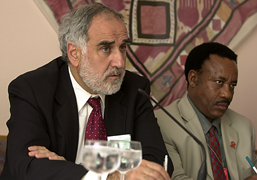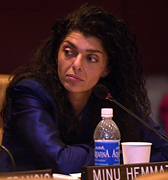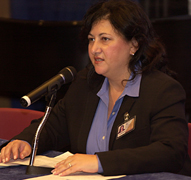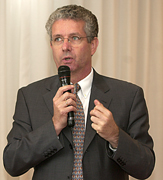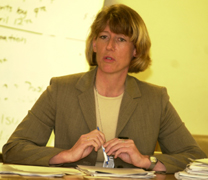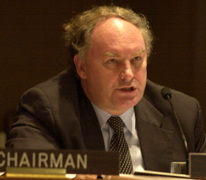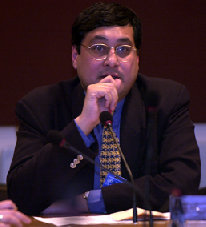|
|
|||||||||||||||||||||||||||||||||||||||||||||
|
|||||||||||||||||||||||||||||||||||||||||||||
|
Events convened on Wednesday, 3 April 2002 |
|
|
Health in
Sustainable Development: Key Issues and Actions Strategies
Ricardo Uauy, WHO/FAO Diet/Nutrition Guidelines, emphasized that diet is the major determinant of an individual's development and quality of life, and thus of national development. He stressed that sustainable development will require a change in the patterns of consumption and production of food, which are presently based on the primacy of meat. He said this shift will require awareness-raising that could be best accomplished through cross-sectoral civil society partnerships.
Derek Yach, WHO, outlined several threats and
opportunities that globalization presents for health. He noted the global
debate between those who support norms and standards to protect health
from the effects of globalization, and those who prefer the use of
voluntary measures and market forces. He stated that complex partnerships
between civil society, the UN system and governments would be required to
enforce such protection. Participants then heard reports on: the Meeting of Health Ministers held in Johannesburg, South Africa, in January 2002; the Health and Environment Ministers of the Americas meetings held in Ottawa in March 2002; and the upcoming Stakeholder Action for Our Common Future Forum to be held at the WSSD.
|
|
Gender perspectives in sustainable development Presented by UNDESA/Division for the Advancement of Women (DAW) and the Women's Environment and Development Organization (WEDO) Irene Dankelman, WEDO, reflected that since UNCED, the profile of women's priorities has risen significantly on the political agenda, although few governments have integrated gender perspectives into policies. She noted that the Women's Caucus is now fighting not only to get a separate section on gender into the Chairman's paper, but also to integrate gender perspectives into the entire document. Minu Hemmati, Stakeholder Forum for Our Common Future, discussed Type II outcomes, noting concerns that they could be dominated by corporations or used to deflect responsibility from governments, but suggested women's involvement therein would add quality and credibility and provide a useful resource for addressing inequality. Jennifer Francis, Gender and Water Alliance, stressed the need to: increase women's participation in water resources management; incorporate gender perspectives in all policies and programmes and in all sectors; disaggregate all data according to sex and social indicators; institutionalize gender perspectives in all organizations; and build women's technical and scientific capacity. Amy Hindman, UNEP, discussed how taking advantage of globalization and privatization can facilitate gender mainstreaming. Citing the privatization of energy in Africa as an example, she highlighted the benefits of packaging energy as an input to income generation, and said gender mainstreaming in this context is enabling men and women to access energy while also taking advantage of opportunities to alleviate poverty.
|
|
Empty Oceans, Empty Nets Presented by the Wildlife Conservation Society
Dawn Martin, Oceana, introduced the screening, stressing that protecting the oceans and ensuring adequate food supplies for all nations is a responsibility of the international community. Ellen Pikitch, Wildlife Conservation Society, emphasized that marine fisheries are in serious decline due to overfishing, wasteful bycatch and destructive fishing practices. She expressed hope that the film would spark action to address this crisis facing the world's oceans. Empty Oceans, Empty Nets portrays the rapid depletion of fish from the oceans and demonstrates how entire populations of fish are becoming commercially extinct. It highlights major threats to marine fisheries, including: growing demand for seafood; changes in technology that have increased the harvesting capacity of fishing vessels, such as sonar detection of schools of fish; destructive fishing practices, such as the use of bottom trawlers, long-lines, driftnets, and dynamite and cyanide; bycatch; and marine pollution. The film outlines means to address this problem, including: closing certain areas to long-lining and other destructive fishing practices; setting catch limits or assigning individual fishing quotas; issuing limited permits to fisheries; restricting the amount and types of fishing gear allowed in a fishery; using more selective fishing methods to minimize by catch; educating merchants, chefs and consumers; and implementing standards to certify well-managed fisheries.
|
|
New financing mechanisms for sustainable development Presented by UNEP in cooperation with the German Federal Ministry for the Environment and the German Federal Ministry for Development Corporation Participants discussed new mechanisms of private financing for sustainable development.
Hanns Michael Hölz, Deutsche Bank AG, described the activities of the UNEP Financial Initiatives, and presented the Deutsche Bank AG Microcredit Fund, which transfers private investment funds to national banks in developing countries in order to build business infrastructure in rural areas, combining local knowledge and NGO support with Western funding and expertise.
Bernard Jamet, consultant, presented Energy
Services Companies (ESCOs) as tools to support energy-saving investments
in developing countries by offering energy saving services, including
arranging financing for energy-saving projects. ESCOs guarantee energy
savings, which end up paying for ESCOs' upfront financing costs,
investments and profit. He stressed the need to broaden the scope of
innovative financing for energy efficiency.
|
|
Sustainable development governance: Retrieving the multilateral system Presented by the Third World Network and International NGO Task Group on Legal and Institutional Matters William Pace, International NGO Task Group on Legal and Institutional Matters, introduced legal and organizational questions for sustainable development, including how to harmonize the relevant conventions, organizations and processes.
Hanne Gro Haugland, Norwegian Forum for Environment and Development, outlined major problems facing international environmental governance, including lack of political will, fragmentation of responsibility for environmental issues, fragmentation of financial mechanisms, and lack of financial resources. Saradha Ramaswamy Iyer, Third World Network, said the CSD lacks sufficient resources to bring the three pillars of sustainable development together. She highlighted the need for corporate accountability with monitoring and enforcement and for a level playing field in partnerships between industry and other stakeholders, and underscored the importance of procedures to resolve conflicts between sustainable development and WTO guidelines. Discussion: Participants discussed several issues, including: the importance of legal means in supporting sustainable development; the need to integrate environmental, economic and human rights laws into a body of sustainable development law; and integration of sustainable development principles into WTO rules.
|
|
Sustainable agriculture in Africa Presented by the World Bank and African Governments
Kevin Cleaver, World
Bank, discussed the Bank's forthcoming updated strategy for rural
development. He highlighted an increased focus on rural peoples'
organizations, community-driven development, and capacity building, and
noted new risk management instruments and a renewed commitment to trade
liberalization in developed countries. Bongiwe Njobe, an
Africa expert, discussed challenges and successes in initiatives underway.
She stressed the need to revisit agricultural policies to access untapped
potential in biodiversity, human capital and the potential range of
African products, and highlighted positive responses to New Partnership
for Africa's Development (NEPAD) and the Forum for Agricultural Research
in Africa (FARA). Callisto Madavo,
World Bank, said the Bank's framework for action in sustainable
agriculture should be country- and region-driven, rather than based on
funder priorities, and highlighted NEPAD as an organization through which
African priorities could be identified to this end. Discussion: Participants discussed, inter alia: the effects of climate variability and change; urban migration and the lack of human capacity for farming; the importance of domestic and regional trade promotion; food security issues; storage and transport infrastructure; land tenure reform; and food safety and sanitation.
|
|
Governance for sustainable development: Answers to complexity Presented by UNESCO and Management of Social Transformation Programme (MOST)
Thandabantu Nhlapo, South Africa, described his country's efforts to make sustainable development a central value in governance, and to address issues of democratic participation, monitoring and enforcement, accountability, and HIV/AIDS. Nazli Choucri, Massachusetts Institute of Technology, noted the need for mechanisms to represent individual voices in sustainable development governance, and stressed the importance of knowledge and knowledge networks, highlighting the example of the multilingual internet-based Global Network for Sustainable Development. Jaime Preciado Coronado, University of Guadalajara, discussed the Monterrey Accord that emerged from the International Conference on Financing for Development, which he said reflects the difference between neo-institutional and democratic citizenship approaches to governance and sustainable development. He stated that the institutional reforms foreseen by the Accord do not meet civil society demands. Adil Najam, Boston
University, listed key challenges for global sustainable development
governance: understanding sustainable development; improving the efficacy
and efficiency of international regimes, including by providing UN
agencies with the resources sufficient to fulfil their mandates; and
representing the voices of all actors.
|
|
|
|
|
The Earth Negotiations Bulletin (ENB) on the Side is a special publication
of the International Institute for Sustainable Development (IISD) in
cooperation with the United Nations Development Programme (UNDP). The Editor
of ENB on the Side is Kira Schmidt
kira@iisd.org
|
|
|
|
| © 2002, IISD. All rights reserved. |
|


